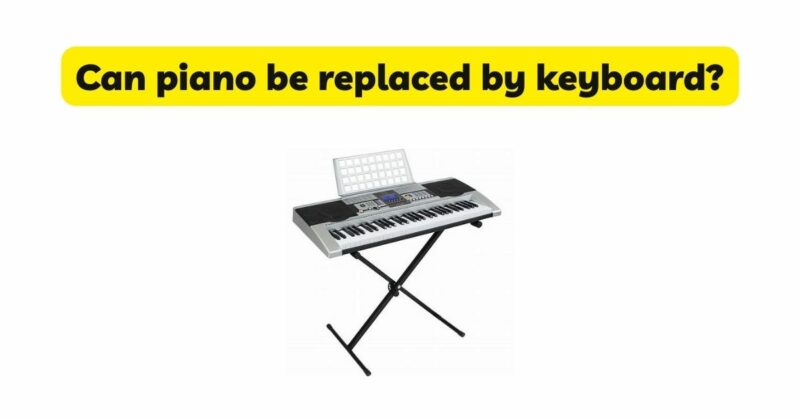The evolution of musical instruments has witnessed remarkable advancements, particularly in the realm of keyboard instruments. As technology continues to progress, electronic keyboards have become increasingly popular, raising the question of whether a piano can be replaced by a keyboard. In this article, we will explore the advantages and limitations of keyboards as potential substitutes for traditional pianos. By considering factors such as sound quality, physicality, expressive capabilities, and learning experience, we can gain a comprehensive understanding of the potential of keyboards in replacing pianos.
- Sound Quality:
One of the fundamental differences between a piano and a keyboard lies in the production of sound. Traditional pianos generate sound through the interaction of hammers striking strings, resulting in a rich, resonant tone. On the other hand, keyboards utilize digital sound sampling to replicate piano sounds electronically. While modern keyboards have made significant progress in sound quality, they still struggle to match the depth, complexity, and authenticity of an acoustic piano’s sound. The acoustic nature of a piano creates a unique and organic tonal palette that remains challenging to replicate convincingly on a keyboard.
- Physicality and Touch:
The physical aspects of playing an instrument contribute significantly to the playing experience. Traditional pianos offer a tactile connection between the player and the instrument, demanding the development of finger strength, touch sensitivity, and control. The weighted keys of a piano, with their varying resistance, provide a nuanced and responsive playing experience. In contrast, keyboards often mimic the feel of a piano through weighted or semi-weighted keys, but they may not offer the same level of touch responsiveness. The lack of a true acoustic mechanism can result in a diminished sense of connection between the musician and the instrument, affecting the subtlety and expressiveness of the performance.
- Expressive Capabilities:
The expressive capabilities of a musical instrument greatly influence a musician’s ability to convey emotions and dynamics in their performance. Pianos excel in this aspect, allowing players to achieve a broad range of tones and dynamics by varying the pressure applied to the keys. The ability to control the attack, sustain, and release of each note provides a level of expressiveness that is challenging to replicate on a keyboard. While keyboards offer features like velocity sensitivity and aftertouch, which attempt to emulate the expressive qualities of a piano, they may not offer the same level of nuance and depth.
- Learning Experience:
The process of learning to play an instrument involves a holistic experience that encompasses both technical skills and an understanding of the instrument’s intricacies. Traditional pianos provide a comprehensive learning experience, as they require the development of proper hand positioning, finger dexterity, and posture. The physicality of a piano aids in the development of muscle memory and a deeper understanding of the instrument. While keyboards can offer a similar layout and weighted keys, they may not provide the same level of tactile feedback or encourage the same physicality in playing. However, keyboards often incorporate features like built-in tutorials, learning modes, and interactive tools that can aid beginners in their musical journey.
- Practicality and Versatility:
In terms of practicality and versatility, keyboards hold a distinct advantage over pianos. Pianos are large, heavy instruments that demand a significant amount of space and maintenance. Keyboards, on the other hand, are lightweight, compact, and portable. They can be easily transported and set up in various locations, making them suitable for performers, music educators, and those with limited space. Keyboards also offer a wide range of sounds and features beyond piano tones, providing musicians with versatility in exploring different genres and styles of music. Additionally, keyboards can be integrated with recording software and other digital music tools, allowing for seamless music production and composition.
Conclusion:
In conclusion, while keyboards have made tremendous strides in emulating the sound, touch, and expressive qualities of a piano, they still fall short of fully replacing the traditional instrument. The unique sound and physicality of a piano contribute to a rich and immersive musical experience that is challenging to replicate on a keyboard. However, keyboards offer their own advantages in terms of portability, versatility, and integration with modern technology. They provide a practical alternative for musicians who require mobility, cost-effectiveness, and access to a wide range of sounds and features. Ultimately, the decision between a piano and a keyboard depends on individual preferences, goals, and the desired musical experience. Both instruments have their place in the world of music, each offering distinctive qualities and opportunities for artistic expression.


